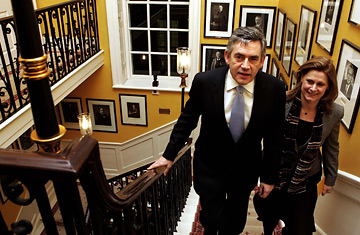
Gordon Brown and his wife Sarah at the Prime Minister's Downing Street residence.
When Tony Blair finally left 10 Downing Street in June, his popularity severely dented by the Iraq war and domestic controversies including allegations that honors such as peerages had been proffered in exchange for loans to the Labour Party, he could still claim to be the most successful Labour premier. Under his leadership, Labour had three times trounced its opponents at parliamentary elections and continued to dominate the political landscape. Gordon Brown, who replaced Blair, had always hankered after the top job in British politics and immediately set out to prove himself at least the equal of his predecessor.
Brown does risk matching Blair, but not in any way he would have wished. In 2006, Blair became the first serving Prime Minister to be questioned as part of a criminal investigation when he was interviewed by police probing the cash-for-honors affair. Now police have confirmed they are investigating donations to the Labour Party that Brown himself suggested at a Nov. 27 press conference had breached the law.
The Prime Minister said that money given to Labour by businessman David Abrahams "was not lawfully declared," while strongly denying any impropriety on his part or any knowledge that Abrahams was channelling his donations to the party through other people. Brown said he had "probably met [Abrahams] on occasion." Asked about his contacts with Brown, Abrahams told the British newspaper The Daily Telegraph that he too found it difficult to be specific. "You don't remember how many times you've eaten porridge for breakfast," he said.
The scandal has already claimed the scalp of Labour's General Secretary Peter Watt, who resigned on Nov. 26 after admitting he knew that monies received from middlemen actually came from Abrahams. He claimed not to have realized that such an arrangement would violate provisions in the 2000 law backed by Labour to improve transparency in political funding. Jon Mendelsohn, Labour's chief fund-raiser, was also made aware of the arrangement last month.
The scandal is the latest blow to Brown's deteriorating political fortunes. Sixty per cent of respondents to the YouGov poll for The Daily Telegraph, published on Thursday, said they think Labour "gives the impression of being very sleazy," compared to 31% who agreed to the same proposition about the Tories. In 1997, the year Blair first came to power, only 19% questioned Labour's honesty compared to 63% who thought the Tories were mired in sleaze.
The YouGov poll also shows the Tories a full 11 points ahead of Labour. As Brown struggled with his latest political problems, Tory leader David Cameron traveled to Washington, where he cut a confident figure in making an address to the Brookings Institution and then in private talks with President Bush, which Cameron described as "positive." It's not a word that Brown would be likely to apply to his recent experiences. The police investigation comes hard on the heels of a series of mishaps and mishandlings that have left Labour reeling. Opponents are questioning Labour's stewardship of the economy, until recently Brown's proudest achievement, after a run on the bank Northern Rock, the U.K.'s fifth largest mortgage lender. On Nov. 21 Brown expressed his regret for the loss by a government department of two computer discs including personal and financial details of 25 million Britons. There are growing signs of disagreement and disorganization inside government with ministers finding their views publicly overruled by Downing Street. Accused in the past of a "Stalinist" obsession with control, Brown is looking increasingly accident-prone. The Liberal Democrats' acting leader Vince Cable joked in the House of Commons about Brown's "remarkable transformation from Stalin to Mr. Bean in the past few weeks."
Others see parallels not with Rowan Atkinson's comedy persona, but with another hapless character, John Major, who took over as Prime Minister from Margaret Thatcher in 1990. "Issues that wouldn't normally be that bad at the moment confirm an overarching impression which is that the government is being sucked into a vortex it can't get out of," says a Labour insider. "The danger for Brown is that this will start to be like the Major government, buffeted by things happening to it, in permanent reactive mode, trying to micromanage each response to each incident, occasionally relaunching, and never really able to get back onto its own agenda."
"I'm still enough of an optimist to believe that's not inevitable," adds the insider. "But it certainly looks pretty bad."
